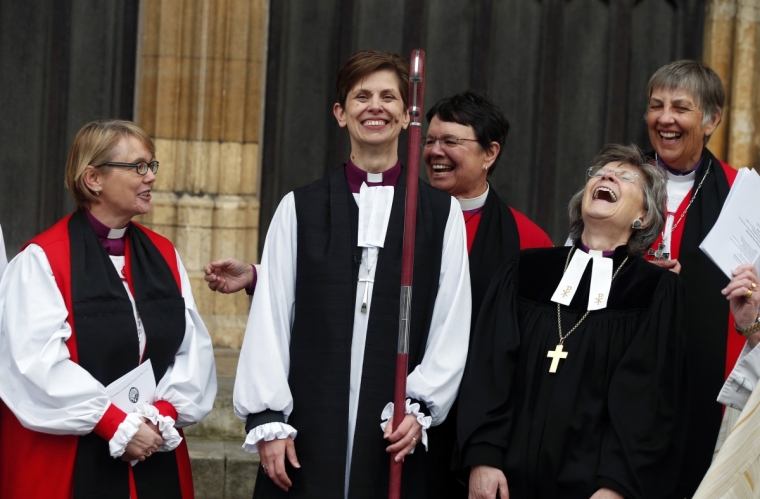Female clergy: God is 'She' & reference to God as a male is 'idolatrous'

LONDON (Christian Examiner) – A group of female ministers in the Church of England wants the church to make it acceptable to refer to God as "She" in its liturgy, multiple newspapers in England have reported.
According to the UK Sunday Times, a group called WATCH (Women and the Church) raised concerns that references to God as exclusively male leave women feeling marginalized and inherently less valuable than men.
But they may also regard exclusively male references to God as "idolatrous."
Rev. Emma Percy, chaplain of Trinity College, Oxford, who belongs to the group, told the newspaper, "When we use only male language for God we reinforce the idea that God is like a man and, in doing so, suggest that men are, therefore, more like God than women."
In January, the Church of England appointed its first female Anglican bishop – the Right Rev. Libby Lane – since its founding in 1534. It is expected to appoint another in July.
Now, other women ministers in the church want to push for the inclusion of feminine references to God as part of a growing effort to empower women.
We seem to attach ourselves to the Roman Empire — to the particular images of King, Lord, Father. If we continue to address our worship to an almost exclusively male God then we are failing God ... because God is so much more than anybody can ever understand.
Hilary Cotton, who chairs WATCH, recently has said the group is "just getting started" in its challenge to the sexism of the Church of England. In a recent debate, Cotton argued one "real bastion of sexism" in the church is the language used to refer to God.
"God is she as often as she is he," Cotton said May 26.
Cotton, the Daily Mail reported, said the group was considering how to best rewrite the liturgy to broaden "our understanding and perception of God" is a task that will take several years. But, according to her, some high-level discussions are already taking place about blunting the "patriarchal" views of the Book of Common Prayer.
"This has arisen now in part because of the change in gender culture but actually it has emerged at all sorts of points in Christian history," Cotton said.
"We seem to attach ourselves to the Roman Empire — to the particular images of King, Lord, Father. If we continue to address our worship to an almost exclusively male God then we are failing God ... because God is so much more than anybody can ever understand," she continued.
The group has not yet said if they will formerly propose calling God "Mother," as well, but some sources report the practice has already taken place.
In Scripture, God is universally referred to as "he" and as "Father," though the authors of biblical texts sometimes ascribed to God feminine characteristics through the use of metaphor.
In Isaiah 66:13, for instance, God is seen comforting the people of Israel in the same way a mother comforts a crying child. In Deuteronomy 32:11, God is depicted as a mother eagle protecting her chicks, and in Luke 15:8-10, Jesus likens God to a housekeeper (a position usually filled only by women in the New Testament era) searching for a lost coin.
The God of Christianity, however, has never been worshipped as a female in an approved liturgy. Doing so would require an uphill fight for WATCH.
In a poll on the London Telegraph's website, fully 85 percent of those who responded said they were against calling God "she."
"Any change in the formal liturgy of the Church of England would require consent, revision and final approval of the General Synod. Even prior to that point, there would need to be consultation with the Liturgical Commission," Cotton said.
The movement to bring about changes like those proposed by WATCH did not begin recently. It began in 2011, when then Archbishop of Canterbury Rowan Williams invited members of the church – laity and clergy of both sexes – to Lambeth Palace for discussions on the role of women in the church.
A record of the event indicates the group discussed gender and the church's liturgy.
Church leaders reminded the laity and clergy then that the church's Liturgical Commission had already published a recommendation that "God may be addressed in prayer in a variety of ways and that authors should be encouraged to incorporate a wide range of metaphors, especially those drawn from Scripture, in the forms of address of the prayers."
In particular, the record states, "The group wondered whether holding to some phrases as unalterable, especially when they are gendered might be idolatrous. 'Father, Son and Holy Spirit' was given as a particular example, which has such powerful historical resonance and status for the church and yet is so predominantly masculine."
Cotton, who now leads the effort to feminize the liturgy, was the scribe at the event during the discussion of language and liturgy.
Justin Webly, who became archbishop of Canterbury in 2012, has not yet responded to reports of female clergy desiring to use feminine pronouns for God.